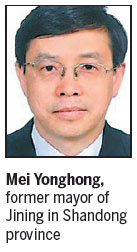'Poorly paid' mayor resigns office
By Zhang Yan (China Daily) Updated: 2015-09-08 08:37The mayor of Jining in East China's Shandong province has resigned and gone into business, authorities in the province said.
Mei Yonghong's resignation was approved by the Jining People's Congress on Sunday, making him the second bureau-level official to quit office in Shandong since June.
Zhang Shuhua, former deputy mayor of Heze, Shandong, resigned and joined the Shenzhen branch of China Pacific Insurance to serve as the secretary of its Party committee in June.
According to one senior Jining government official who declined to reveal his name, Mei will serve as an executive in Shenzhen Huada Gene Technology. China Daily was unable to contact Mei for a comment.
From 2010 to 2015, Mei was the deputy party secretary and mayor in Jining. His last public official activity was on Sept 1, when he attended the Jining cultural center opening ceremony at Taibai Lake. Since then, he has not been seen in public.
Mei said in an interview in March that civil servants in China get a very low wage. His monthly income was about 7,000 yuan ($1,100), and county-level officers could earn as little as 3,000 yuan, far less than migrant workers in factories.

"I have to work more than 10 hours a day and have hardly any weekends or holidays, but get so little salary," he told the Southern Metropolis Daily.
Since the new leadership was elected in November 2012, the country has conducted a drive to fight against corruption. More than 100 officials at ministerial and provincial level or above have been investigated for alleged graft issues.
Meanwhile, lots of government officials, including many at bureau level, have quit due to the authorities' tightened supervision on their administrative powers and the pressure the anti-corruption campaign has put on them.
Taking Hunan province as an example, since 2012 more than 15 civil servants above county level have resigned, half of whom had invested in businesses.
The involved officials quit mainly because of low wages or difficulties in running their offices.
Tang Zhijun, professor of economics at Hunan University of Science and Technology, said that on one hand, some officers leaving to go into business will reduce costs, which will enable the government to "invest more money in people's livelihoods, improve working efficiency, then win more trust from the public".
On the other hand, it's more than necessary to "improve the relevant mechanism to supervise the officers' powers and motivate them to perform to the best of their abilities to serve the public", he added.
zhangyan@chinadaily.com.cn
- Delegation salutes Tibet anniversary
- Officials are told to act as anti-graft watchdogs
- Great Wall safeguarded in united action
- Vice minister pledges more efforts to improve air quality
- Beijing’s efforts to control air pollution start to pay off
- China's military committed to reform
- Netizens rip singer over baby photos
- Central govt's growing support for Tibet
- Monument to be built on Tianjin blast site
- China and Russia seal raft of energy deals







